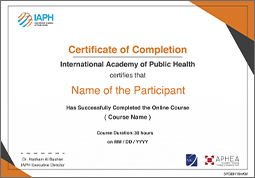Health Promotion for Noncommunicable Diseases
Description
This course introduces the participants to the field of health promotion and provides an overview of key health promotion definitions and concepts. Trainees will learn some of the key theories underpinning health promotion and examine the key strategies used by health promoters to take action on the major non-communicable diseases affecting individuals and communities.
This course is intended to develop the understanding of participants of health promotion at individual, group, community and national levels, as well as their critical thinking around the social determinants of non-communicable diseases approaches to health interventions.
Learning Outcomes
- Explain key health promotion definitions and concepts
- Explain the key theories used in health promotion practice
- Comprehend how theories are applied to promote health at the individual, community and societal levels
- Review and critique major approaches to health promotion (e.g. policy, behavior change, community engagement, advocacy and social marketing)
- Identify and describe the key challenges facing health promotion programs in both developed and developing country contexts
- Understand how health promotion strategies promote physical activity, good nutrition and dietary practices and smoke free environment
- Select the most appropriate strategy, or mix of strategies, for addressing non-communicable diseases
- Health Promotion Approaches, Principles, and Interventions
- Strategies to Promote Good Nutrition
- Strategies to Promote Physical Activity
- Ethical and Political Dimensions of Health Control
- Understanding Health Promotion and Health
- Value and Role of Partnership

Duration:
30 Learning Hours
Accredited By:


Certificate

Are you interested in the course?
Get notified once the course is open by clicking on
Health Promotion for Noncommunicable Diseases
Thank you for registering your interest! We appreciate your enthusiasm for this course. As soon as it becomes available, we will reach out to you with all the details. Stay tuned!